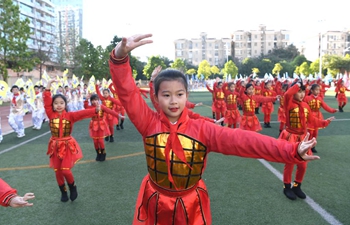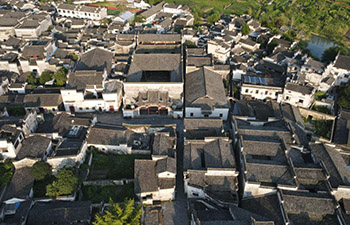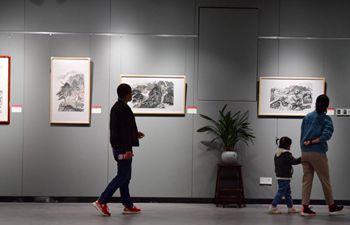BEIJING, April 25 (Xinhua) -- As China hosts the Second Belt and Road Forum for International Cooperation (BRF) in Beijing this week, unfortunately, some Western people have as always conjured up fantastic theories like "neocolonialism" to maliciously throw mud at China's cooperation with B&R countries.
They even claimed that the Belt and Road Initiative (BRI) is a "geopolitical tool" and would push some countries into a "debt crisis." This demonstrates a lack of objectivity and fair understanding of the initiative and fails to see the globalization nature of the BRI.
Some 5,000 participants from more than 150 countries and 90 international organizations, including heads of state and government from nearly 40 countries, attend the BRF this year. The number of attendees is much more than the first BRF two years ago.
Such extensive participation not only shows the initiative accords with the common aspiration of the countries but also disproves the neocolonialism accusation against China.
When it comes to neocolonialism, the Western critics mean a powerful country uses its economic and political influence to control another country. This definition runs counter to the real meaning of the BRI.
China had suffered colonial and semi-colonial rule in modern times and now truly knows the bitterness of being colonized. China has never intended to control other countries as it lives by motto of confucianism "Do unto others as you would have them do unto you."
The BRI, proposed by China nearly six years ago, is a blessing amidst a world faced with common challenges such as growing uncertainties and destabilizing factors. The final goal is to promote high-quality common development through better connectivity.
The initiative has since been warmly welcomed, and historic stories of cooperation and development are emerging from around the world. Thanks to the BRI, east Africa has its own expressway, the Maldives owns its first inter-island bridge, Belarus can produce sedans, and the number of freight trains between China and Europe is on the rise. The list of the outcomes of the B&R construction is ever growing.
China has never forced any country to sign up to the initiative, rather, it always emphasizes policy coordination and the alignment of development plans between B&R countries.
Over the past few years, China has signed over 170 cooperation documents on the BRI with more than 150 countries and international organizations. The B&R has expanded from Asia and Europe to more new participants in Africa, Latin America and the South Pacific.
Changes brought by cooperation under the initiative have fully proved that the BRI is China's idea, but the opportunities it has created belong to the world, and it should not be seen as expansionism, but rather an open, inclusive and transparent cooperation platform.
One telling example is China's aid to Africa. From supporting African countries in their struggle for national independence to assisting them in developing their economies, China has sincerely helped Africa explore its path toward revitalization without attaching any political conditions.
Long gone is the history of enslavement in Africa by the West. But the ills of one-sided economic structure and backward infrastructure, left behind by Western colonizers, are not easily remedied. Today, Africa's weak status in the global economy is directly related to its past of being colonized.
Different from the West's old colonial mentality, China's investment in Africa is fully based on respect for local laws, policies and environmental protection concerns, primarily focusing on helping Africa obtain its own capacity to achieve sustainable development.
The so-called debt crisis is also highly questionable. Africa's debts owed to China only make up a small share of its total and are quite manageable. The Chinese loans are concessional, with long maturities and low interest rate. For China, it does not intend to increase debt burdens for Africa as that would not be beneficial for either party.
Currently, economic globalization is the historical trend, but global deficits such as governance, trust, peace and development remain severe challenges faced by mankind.
To better address such deficits and offer solutions for global governance, the second BRF set "Belt and Road Cooperation, Shaping a Brighter Shared Future" as its theme to promote the high-quality development of B&R cooperation.
As a multilateral cooperation platform committed to creating more values for all, the BRI will continue to facilitate cooperation between participating countries. More importantly, it provides more cooperation possibilities among the participants.
In the new era, along a path toward common prosperity, progress can not be achieved at the expense of the others.
In this regard, the West's accusations and prejudice against China's moves of benign intention are no longer in line with the historical development trend.












